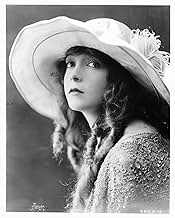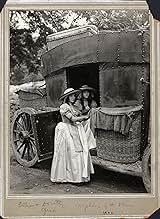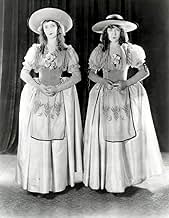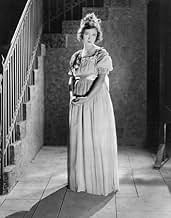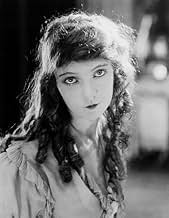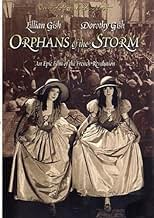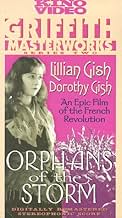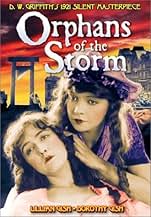Em meio às turbulências da Revolução Francesa, duas irmãs órfãs encontram a desgraça e o amor.Em meio às turbulências da Revolução Francesa, duas irmãs órfãs encontram a desgraça e o amor.Em meio às turbulências da Revolução Francesa, duas irmãs órfãs encontram a desgraça e o amor.
- Direção
- Roteiristas
- Artistas
- Prêmios
- 1 vitória no total
- Direção
- Roteiristas
- Elenco e equipe completos
- Produção, bilheteria e muito mais no IMDbPro
Avaliações em destaque
Part I of the story opens with the killing of a commoner. The slain man's wife is revealed to be the daughter of an aristocratic family who feel she was injudiciously married. They decide to take the infant child from her and leave it on the steps of Notre Dame Cathedral in the dead of winter where she might get picked up and adopted by some kind-hearted soul, with a note attached that reads, "Her name is Louise. Save Her." Later, as the snow continues to fall, a poverty-stricken father named Jean Girard, arrives to leave his own baby, Henriette, to the cathedral steps. After noticing the shivering infant Louise, Girard realizes that he cannot bring himself to do the same for his own child, so he decides to bring home both babies. After returning home to his wife with the babies, Girard encounters a purse full of money left with Louise. With this money, the Girard's rise above their poverty-stricken background and raise the two girls happily in a northern providence. Years pass. A plague comes, killing both parents, and blinding Louise (Dorothy Gish). Henriette (Lillian Gish), her sister and guide, accompanies her blind sister to Paris in the hope of locating a famous doctor who may be able to restore her sight. On their way, they attract the attention of Marquis de Praille (Morgan Wallace), a nobleman, who becomes so interested in Henriette that he arranges to have her kidnapped upon the arrival in Paris and brought to a lavish party given that night at his great estate, thus, leaving the blind Louise to roam the streets of Paris alone, until she is taken in by Pierre (Frank Puglia). But as fate would have it, Pierre has an old hag of a mother, Frochard (Lucille LaVerne), who decides to use the blind girl by having her sing and beg in the streets for money. At first Louise refuses, but after being left alone in a room surrounded by rats, she agrees to do her bidding. As for Henriette, she escapes the estate of De Praille with the aide of Chevalier de Vaudrey (Josef Schildkraut), an aristocrat who not only pities her, but agrees to help her search for Louise. During the search, Henriette falls in love with Chevalier, who, in turn, happens to be the nephew of Louise's birth mother (Catherine Emmett), still mourning for the loss of her child of long ago, now the wife of the famous count, who is unaware of his wife's secret past. PART II of the story continues to focus on Henriette's search for Louise and her encounter with Chevalier. After learning of Louise's whereabouts and being victim of the evil Mother Frochard, she locates the old hag who tells her that her sister has "died." But as Henriette gets closer to learning the truth and finding Louise, something always intervenes to prevent their reunion, especially the riot and outbreak of the French Revolution, having the aristocrats arrested, sentenced and executed by the one and only guillotine, with the innocent Henriette taken in to become one of those tortured victims.
"Orphans of the Storm" ranks one of the best of the DW Griffith silents, and one that should still hold interest throughout, particularly its story that plays liked a chaptered serial. Of all the supporting players, which range from Monte Blue, Sheldon Lewis, Creighton Hale, Louis Wolheim and Kate Bruce, Lucille LaVerne as the mean old hag named Mother Frochard, old clothes, uncombed hair and some missing front teeth, is the most memorable because of her natural meanness. One scene comes to mind is the one when, after forcing the blind Louise to beg on the streets as the snow falls around her, Mother Frochard decides to take the shawl away from her, feeling that the more she shivers, the more money she will collect. LaVerne would play a similar character in appearance in the 1935 MGM version of "A Tale of Two Cities" starring Ronald Colman. LaVerne leaves a lasting legacy playing old hags, especially during French Revolutionary times. Another memorable performance given in this production is by Leslie King (who sometimes resembles Boris Karloff), playing a character named Jacques Forget-Not, an unforgiving sort who avenges those aristocrats who tortured his poor father by sending them to their execution.
In spite of some flaws, and there are several, particularly a couple of unrelated scenes and unnecessary added comedy relief that distract from a viewer's attention, whose main focal point is on the two orphans, there are memorable scenes along with lavish background scenery and costumes that are an added bonus in capturing the flavor of 18th century Paris.
"Orphans of the Storm" was one of 13 silent features shown on public television's 1971 presentation of THE SILENT YEARS, as hosted by Orson Welles, with an original and excellent piano score accompanied by William Perry, the print that was formerly used in the BLACKHAWK VIDEO collection back in the 1980s, and the one formerly shown on Turner Classic Movie's SILENT Sunday NIGHTS before a new copy, available by KINO video, accompanied by a new (and very unsatisfying)chamber music score, clearer picture quality and a longer 150 minutes length. In spite of which version to see, "Orphans of the Storm" still ranks one of the best silents produced by the Griffith company shortly before the great director's decline. (****)
"Orphans of the Storm" is another magnificent epic by D. W. Griffith and his last success. The film impresses in many aspects, such as the screenplay, the set locations and fantastic camera work, with impressive angles considering the size of the cameras and the technology in the early Twentieth Century. The plot is a combination of heavy drama, romance and action and sensitive viewers will certainly need a handkerchief to see the touching scenes of the sisters set apart. The suspenseful conclusion, with Danton and his men trying to deliver the pardon of Henriette and Chevalier de Vaudrey, is suspenseful and thrilling. The lovely Lilian Gish is another attraction with a wonderful performance. Last but not the least, "Orphans of the Storm" is a mandatory film for any cinema lover. My vote is nine.
Title (Brazil): "Órfãs da Tempestade" ("Orphans of the Storm")
DOROTHY GISH and LILLIAN GISH are the sisters, with Dorothy as the blind waif who is separated from her sister when an overly amorous nobleman orders Lillian to be brought to his orgy. From there on, the Dickensian plot becomes thicker and thicker as the girls suffer one indignity after another in order to survive.
LUCILLE LaVERNE is the old hag (she later was the model for Disney's Wicked Witch in "Snow White"), a harridan who makes Dorothy a beggar in the streets. "You'll shiver better without a shawl," is one of her immortal lines.
Joseph SCHILDKRAUT is very impressive in an early American screen role, demonstrating charm and skill of the kind that would land him important parts in future costume films like "Marie Antoinette." MONTE BLUE is Danton, a man who meets LILLIAN GISH early in the story and later becomes the defender who saves her and Schildkraut from the guillotine.
It's all very melodramatic, the acting ranging from overdone to wildly overdone. Griffith was never subtle in asking his performers to give it their all. Excessive wringing of hands, eye-rolling to show anguish, fierce looks to show hatred, etc. may cause unintended chuckles when viewed by today's audiences, but there is never any letdown in the telling of a compelling story using the French Revolution as rich background material for a tale of villainy and heroism.
A fascinating silent film with an appropriate film score added to give the story even more force and flavor.
Summing up: Overlong drama, but compelling from the start to the feverishly melodramatic end.
Exquisite close-ups of Lillian Gish are touching and lend poignant charm to her performance.
Lillian Gish is Henriette Girard and her sister Dorothy plays her "Sister" Louise. The amazing Joseph Schildkraut plays de Vaudrey, a nobleman who truly is noble. The "storm" in the title refers to the French Revolution, which is the background this story of family and romantic love plays itself upon.
As usual, Lillian Gish is wonderful in her role as the devoted sister Henriette; but it is Dorothy Gish as blind sister Louise who is truly the star of the film. Her performance drips with the pathos, pain, and longing that most people associate with her older sister. Schildkraut shines in this, his first Hollywood film role.
The frequent ridiculous scenes (Danton running to save Henriette from the executioner's blade?) and length of the film will turn most modern viewers off; but those who have a love of history, epic spectacle, and the timeless beauty of the Gish sisters will enjoy "Orphans of the Storm".
History's sweeping drama comes alive in this powerful epic film from legendary silent movie genius D. W. Griffith. Although much happens on a broad canvas, the director never loses sight of the intimate details of the heroines' pitiful plight. In denouncing tyranny, Griffith always manages to keep the viewer engrossed in how the State's insidious evil affects the individual.
Much of the film's success is due to the remarkable acting of the Gish Sisters, Lillian & Dorothy. Acclaimed for her comedic talents, Dorothy here gives an almost completely serious performance, portraying a blind girl cruelly separated from her beloved sister and forced to beg in the streets. Lillian, her classic face mirroring a myriad of emotions, plays the sibling persecuted by both lecherous aristocrats and rapacious revolutionaries. The scene in which Lillian, in an upper chamber, hears Dorothy singing in the alley below but is unable to reach her, is almost unbearable in its emotional intensity.
A young Joseph Schildkraut plays Lillian's blue-blooded suitor, giving the viewer an intimation of the very fine character actor he would become with the advent of talking pictures. Lucille LaVerne steals more than a few scenes as the filthy harridan who enslaves and terrorizes Dorothy. Frank Puglia makes a poignant mark as Miss LaVerne's pathetic, downtrodden son. Comic actor Creighton Hale gives a lively performance in a small role as a mischievous, periwiged servant.
A fascinating aspect of the film is its vivid rendering of two historical characters of great significance in the history of France. Georges Danton was probably not as noble as he is portrayed by Monte Blue, nor was Maximilien Robespierre necessarily as evil as Sidney Herbert depicts him. What is certain is that both men were responsible for the deaths of thousands of individuals during the Reign of Terror. Fittingly, each man had his own rendezvous with Madame Le Guillotine in 1794.
Movie mavens will recognize an unbilled Louis Wolheim as the executioner awaiting Miss Lillian on the scaffold.
Griffith handles the sequences involving surging masses of extras with admirable dexterity. He also freely borrows a few plot elements from Dickens' A Tale of Two Cities. In fact Miss LaVerne, with scarcely a costume change, would play the role of The Vengeance in MGM's 1935 version of that classic, violent novel.
Você sabia?
- CuriosidadesWilliam J. Walsh, an extra playing a soldier, was killed on set when a prop rifle he was leaning on went off by accident; although the weapon was loaded with a blank cartridge, the wadding from a blank fired at point-blank range is capable of inflicting serious injury or death.
- Erros de gravaçãoWhen the Bastille is taken, the prisoners are freed. There are many of them. In reality, only seven prisoners were freed during the taking of the Bastille.
- Citações
Title Card: [Opening lines] TIME, - Before and during the French Revolution. Our story is of two little orphans who suffer first through the tyranny - selfishness - of Kingly bosses, nobles and aristocrats. After the King's Government falls they suffer with the rest of the people as much through the new Government, established by the pussy-footing Robespierre through Anarchy and Bolshevism. Strange that both these evil rulers were otherwise highly moral men except that they saw evil in all who did not THINK AS THEY DID. The lesson - the French Revolution RIGHTLY overthrew a BAD government. But we in America should be careful lest we with a GOOD government mistake fanatics for leaders and exchange our decent law and order for Anarchy and Bolshevism.
- Cenas durante ou pós-créditosThe starring Gish sisters are not listed in the opening credits. They are introduced on title cards as "Louise--Miss Dorothy Gish" and "Henriette--Miss Lillian Gish."
- ConexõesEdited into O Capital no Século XXI (2019)
Principais escolhas
- How long is Orphans of the Storm?Fornecido pela Alexa
Detalhes
- Data de lançamento
- País de origem
- Idioma
- Também conhecido como
- As Duas Órfãs
- Locações de filme
- Mamaroneck, Nova Iorque, EUA(D.W. Griffith: Father of Film)
- Empresa de produção
- Consulte mais créditos da empresa na IMDbPro
Bilheteria
- Orçamento
- US$ 1.000.000 (estimativa)
- Tempo de duração2 horas 30 minutos
- Mixagem de som
- Proporção
- 1.33 : 1
Contribua para esta página



